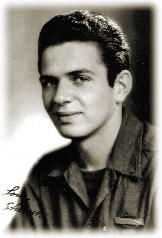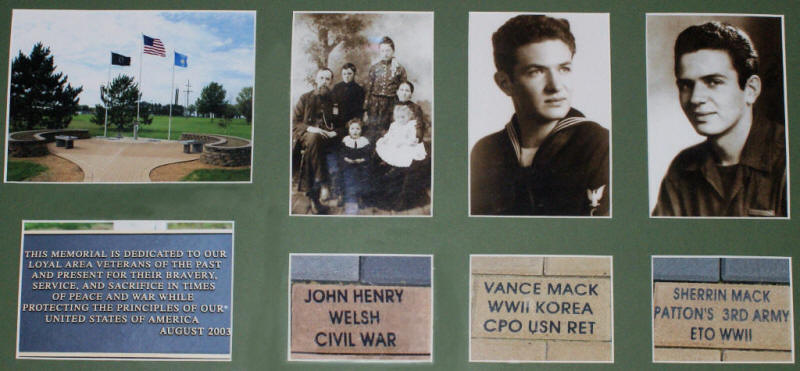My name is Sherrin Mack. I was born in Loyal, WI where I attended both grade school and high school. I graduated when I was 17 and as soon as I was 18 in September, went to the service. This was in 1943. I was sent to Camp Shelby, Miss. for my basic and unit training. We were used as replacements for infantry units in action. Because of my age I was not sent in the first units. As soon as I was 19, I was shipped to Europe with the 65th division. We landed at LeHarve France. We were then put in a holding camp called Camp Lucky Strike. The weather was bitter and many of us suffered trench foot and frozen feet. There were amputations and many other problems with the cold. It was not long before we were attached to General Patton's 3rd Army and saw our first combat action. We relieved the 95th Divison in Saurlautern, Germany. The town was a total mess. We stayed in the cellars of what used to be buildings. We were only about 100 yards from the Germans and we could hear them talking and swearing. We attacked one morning about 8 a.m. We were all raw rookies and had a lot to learn. We were able to secure our side of the street with only one wounded out of our squad of 12. Our BAR (Browning automatic rifle) man, Grinstead, saw a German about 50 yards from him and completely missed him. We could not believe it. I asked many days later what happened. He said," Mack, I just did not know if at that close range if I wanted to kill another man". He said," I aimed for his feet." A friend of mine, Norman Kirkpatrick had the second Squad of the 3rd platoon and attacked on the other side of the street. His squad was going well until one of his men stepped on a foot mine and alerted a German machine gunner. Of the 12 men in his squad they lost 10. We finally called up an American tank to take care of the machinegun. Norman had been in Australia with Earl Rabb, who lived across the hedge from me in Loyal so we had quite a few conversations. He was a good man who had just gotten married before he was shipped overseas. My wife and I went to Luxemburg in 2003 and visited his and other graves.
Our baptism at Saarlautern and in the Saar river basin .
We moved on to breach the Seigfried line March 17th to 19th. The 65th crossed the Rhine on March 29 and 30. The division moved on to secure the Mulhausen-Langensalza line, April 4-6. Then moved on to battles for Struth and Neumarkt from April 7 to April 22nd. We crossed the Danube to take sector at Regensburg April 25th to April 26th. The enemy surrenders unconditionally May 8th. Although we did not spend nearly as much time in combat as most of the older divisions, we were very proud of the 65th. Some of our accomplishments were: First Div. to disembark in France, (LeHarve), Spearhead Division for General Patton's 3rd Army Div. in Germany, Traveled further and faster than any other Div. in ETO, 583 miles, closest American troops to Berlin on Easter Sunday 1945. In the march to Regensburg at Neumarkt, formed the southern flank for the entire 3rd army, First 3rd army unit to cross the Danube river and became the first American unit to capture an enemy fleet: 36 German and Hungarian vessels surrendered at Linz, Austria on the Danube. Greater east European penetration reached than any other American Division , Erlauf, Austria, 45 miles east of Linz and 55 miles west of Vienna (as listed in Ripley's Believe It Or Not), Last Div. activated and first Div. to be deactivated in WWII. Activated July 1st, 1943 and deactivated August 31st, 1945. During the above time we moved very fast (the infantry). We hitched rides on anything we could, half- tracks, trucks or any other means. I can remember riding in half-tracks with 50 calibers mounted in them. When German planes came over, the first one to get to the 50 got to shoot it. One day a plane came over so fast nobody even got to the 50. The Germans were the first ones to use jets in combat; it was the first one I ever saw. Things were moving very fast now. I can remember a German officer handing me his pistol in, I think it was Frankfurt. (I lost it in a poker game on the ship on the way home.) We waded across the Inn River in Austria; We were up to our necks in very cold water under light small arms fire. We had to hold our M1 rifles above our heads with one hand and hold onto a loose rope with the other. That, along with France, was the coldest I have ever been. We had one of our medics shot right through the cross on his helmet. The next day the men in our company were not very sociable, to say the least. Some things we were not very proud of, you have a different mind set under those conditions and we were very young and immature. In the last days, we were in the vicinity of Linz. The Germans had old men and boys fighting. In the last days we did not have much opposition. After 60 some years I have forgotten a great deal of what happened . We were a very happy bunch when the war ended on May 8th. General Patton came to Linz and gave a long speech and thanked us very much. I was transferred, along with our squad, to the border with the Russians. We did not like each other very much. Before they came we would fish in the river for trout with hand grenades. After they came they would not let us into their sector to fish. We got even though, we would fire BAR tracers into their chimneys at night. They would sneak into our sector and steal things, chickens, livestock, even women. They tried to take a man from our side one day. The man took off running and a member of our squad (Bloomberg) grabbed the Russian's gun and saved the man's life. They thought he had been in the SS during the war. He had not, as he had no tattoo in his armpit that signifies he was an SS member. I was very glad to get away from those people.
It was not long before I was transferred from the 65th Div. to the 9th Div. at the concentration camp at Dachau. I worked as a guard at the first war crimes trial held in Dachau. Some of the crimes that these people were accused of are unimaginable. One of the things they did was hang the man with his toes just touching the floor, when his arms would go he would slowly strangle. I had seen during the war what the concentration camp victims looked like when they were liberated and it would make us cry. We helped liberate Mauthausen and one of the satellite camps at Linz They were very brave people, most of them Jews, but there were many other men from other countries interred in these camps. We had 42 prisoners on trial and 36 were sentenced to hang.
While I was in an incredible thing happened. One early morning in March we were ordered to fall out with just billy clubs and flashlights. We were taken to the prisoner barracks and given orders to put these Russians into boxcars to be taken back to Russia. They had defected from Russia and gone to Germany. When we walked into the barracks it was an incredible scene. I was horrified to see a number of them jump off their bunks and hang themselves from the beams. We tried to stop them but were stopped by masses of other prisoners. They did not lift a hand to hurt us only used their bodies to keep us away from those that were hanging. Others were cutting their throats with anything they could get their hands on. There were GIs that used their clubs on the prisoners as they herded them towards the boxcars. It was very cold weather, I remember there was snow on the ground. There was a trail of red from the barracks to the cars. Most of them were lightly clad, some without shoes and they were nailed into the boxcars. Sickened, I walked up to the highest American officer I could find and told him, "This is one day I'm ashamed to be an American". Some of the prisoners were quite young, 14, 15, 16, and I think some even younger. One was crying because he was separated from his brother. I loosened the end of the crating and put him on the side with his brother. These people were executed when they got back to Russia by the Stalinist regime along with some 20 million political prisoners. There have been estimates of over 100,000 of these people sent back and our country was part of it, it has only recently been admitted and put in print in a very few magazines. The American Legion Magazine is one of them. Truly for us it was a day of infamy. If anybody is interested in this or questions this, I have two articles written by men that were a part of it.
I was *discharged from Camp McCoy, May 4, 1946 and shipped home at the end of the month. In 1947 I married the prettiest girl in Loyal and we have 8 children. In 2003, my wife and I went back to Germany and visited the cemetery in Luxembourg where some of our outfit was buried, as was General Patton. Norman Kirkpatrick is buried there along with some of his squad. There are thousands of graves in this cemetery and in many cemeteries in Europe. We then went back to Dachau where the gas chamber still remains, along with the ovens and torture chambers. After 60 years, things were so different it did not seem real. In ending, I want to say how lucky we were in contrast to the many that went through so much for so long, and to the over 400,000 military from both fronts that never came home.
Photo Board by Gary Mack


